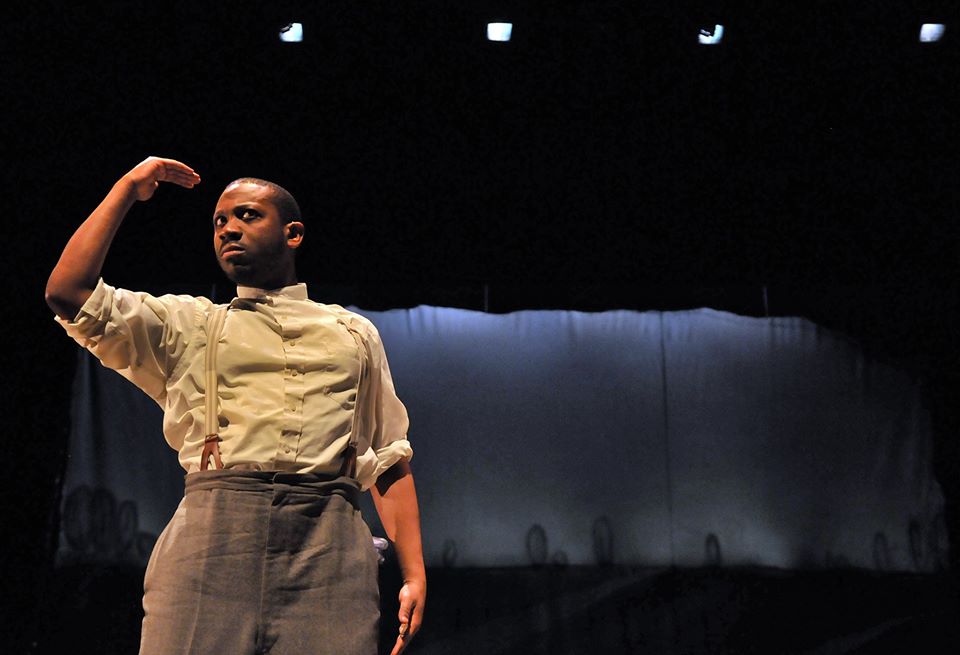
Elbert Joseph as Tuc in Mother Hicks at Emerson Stage. Photo by Craig Bailey, Perspective Photo.
Presented by Wheelock Family Theatre
Written by Suzan L. Zeder
Composed by Peter Stewart
Directed by Wendy Lement and Kristin Johnson
Choreographed by Patricia Manalo Bochnak
March 13 – 22, 2015
200 The Riverway
Boston, MA
Wheelock on Facebook
PART TWO OF THE WARE TRILOGY, produced with Emerson Stage (Mother Hicks, February 2015) and Central Square Theatre (The Edge of Peace, April 3-12, 2015)
Review by Kitty Drexel
(Boston, MA) In Susan Zeder’s The Taste of Sunrise, Tuc (Elbert Joseph) grows up poor, black and deaf in an ASL-ignorant hearing community in Ware, IL. At the behest of the well-intentioned Dr. Graham (Donna Sorbello), Jonas Tucker (Cliff Odle) sends Tuc to a school for the deaf to learn how to speak. After years of social solitude, he finally meets kids just like him. They teach him sign; Tuc learns to communicate and to express himself. With help from friends Maizie (Amanda Collins) and Nell Hicks (Brittany Rolfs), discovers what it means to self-discover, to lose and then rebuild one’s identity.
Wheelock Theatre is no stranger to inclusivity. They routinely host performances for the hearing and visually impaired. Taste of Sunrise is told through spoken dialogue, ASL interpreters, and supertitles. Traditional actors are joined by ASL actors who sign the dialogue as the traditional actors speak. When appropriate, the supertitles are projected onto the stage above all of the action. A delicate balance is struck as both types of actors share the stage to interpret Zeder’s play. Director’s Johnson and Lement have done an excellent job to gently conveying the great strides this production takes towards equality. This is an inclusive, intersectional production that encourages the hearing audience to learn from the performance. It warmly welcomes the members of the disabled community into the audience, whoever and however they are.
Elbert Joseph delivers a strikingly beautiful and sincere performance as Tuck. With simple movement and gesture, he was able to convey opposite ends of the emotional spectrum. He tells a spirited story with such warmth that it’s specific message instantly reaches across the divide to be universally appealing and inspiring. While the performances of the rest of the cast are excellent, this production would not be as great as it is without Joseph. It is his performance as Tuc that blends all of the separate elements into one successful production. He was a wonder to watch.
It is deeply satisfying to watch a performance that normalizes the experiences of the disabled. In a beautiful contrast, it outs the abled community’s behavior as strange and awkward when the two communities commune. In this production, when Tuc experiences hardships or trauma, it’s regularly because the hearing aren’t paying attention to Tuc’s needs. For example, Tuc is calmly hunting honey in Act 2 when a pair of hearing men see him covered in bees. They assume the worst, try to save him, but their involvement leads to Tuc’s serious injury. This episode is a brilliant metaphor for the abled community’s influence on the disabled community. Had they regarded Tuc’s behavior first or, heaven forbid, trusted Tuc’s experience, the bees wouldn’t have stung anyone.
There are dramatic moments in this production that some might find disturbing. In one scene, Tuc is bound to his hospital bed. Johnson and Lement make it abundantly clear to the audience that Joseph could break character and walk away at any moment. Rather, these scenes carry weight because of the emotional trauma Tuc experiences. Just as Tuc is casually stripped of his humanity in earlier scenes that depict him engaging the people of Ware, he is similarly but more traumatically stripped when he is bound by his hands to a bed by doctors. Tuc isn’t just restrained, his voice is silenced. The hearing community has denied Tuc agency and expression. It’s disturbing because it should be.
All of humanity shares an innate need to connect, to understand and to be understood. While The Taste of Sunrise is specifically about a deaf child learning to live in the world around him, it is also about Man’s need to self express in order to understand and be understood. It is a complicated production but Wheelock has divided its heavy material into bite sized, manageable chunks for viewers young and old to enjoy.
